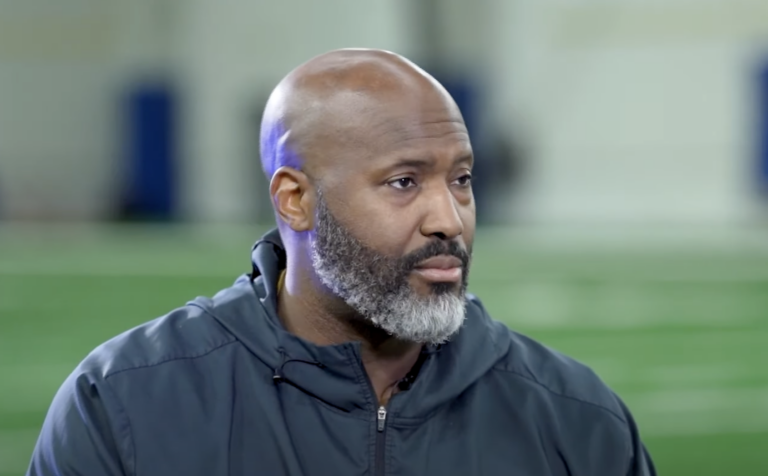How a Hall of Fame Legend Helped Shape Brad Holmes’ Bold Gamble on Jahmyr Gibbs
When the Detroit Lions selected Jahmyr Gibbs with the No. 12 overall pick in the 2023 NFL Draft, many football analysts were left puzzled. In today’s NFL, taking a running back that early is often considered outdated thinking. But Lions general manager Brad Holmes wasn’t following trends—he was following his instincts, guided by advice he received two decades ago from a Hall of Fame running back.
Fast forward to 2024, and Holmes’ decision is looking smarter than ever. Gibbs exploded onto the scene, racking up over 1,400 rushing yards and 20 total touchdowns. He’s quickly become one of the NFL’s most electrifying young players. But behind Holmes’ draft-day decision was a memory that resurfaced at just the right moment—a conversation with Marshall Faulk.
A Conversation That Stuck
Back in 2003, Holmes was just starting out, working as a public relations intern with the St. Louis Rams. It was during that time he had a chance to sit down and talk with Marshall Faulk—one of the greatest dual-threat running backs the game has ever seen. That moment, Holmes now admits, never really left him.
Faulk told him something that would eventually influence a franchise-altering move:
> “Where this game is going to, you don’t have the space… You can’t have a short-yardage back and a third-down back and a scat back and a goal-line back. You’ve got to be able to do it all, man.”
Years later, while watching Gibbs’ game tape from Alabama, it all clicked for Holmes.
> “This guy’s a weapon and can just do it all,” Holmes recalled on the Field Talk Podcast. “That conversation I had with Marshall Faulk just started coming back to me.”
Trusting His Own Eyes
Instead of following the usual draft-day logic about positional value, Holmes leaned into his vision of the modern NFL. In a league shaped by salary cap constraints and evolving offensive schemes, versatility is more than a luxury—it’s essential. And Holmes wasn’t about to pass on a player he believed could redefine his team’s offense.
> “It’s hard to go against the grain,” Holmes admitted. “Our brains are naturally wired to… go with the flow. But I’ve always been told to scout with my own eyes.”
That mindset led him to Gibbs, whose ability to run, catch, and create mismatches reminded Holmes of exactly what Faulk had described 20 years earlier.
The Proof Is on the Field
Holmes’ vision materialized in one of the league’s most dangerous backfield duos. With Gibbs alongside David Montgomery, Detroit now boasts a one-two punch that’s both powerful and unpredictable. Gibbs, in particular, has been a revelation—stretching defenses with his speed, creating big plays in both the run and pass game, and giving the Lions a serious offensive edge.
What makes this story more compelling is that it wasn’t a calculated risk backed by spreadsheets or analytics. It was personal. It was intuitive. And it was rooted in wisdom passed down from one of the game’s greatest running backs.
Looking Ahead
Sometimes the best moves are the ones that challenge conventional thinking. Brad Holmes’ decision to draft Jahmyr Gibbs wasn’t just bold—it was visionary. Fueled by a long-held belief in versatility and a conversation that stuck with him for two decades, Holmes made a call that could define his legacy in Detroit.
In the end, the connection between Holmes, Faulk, and Gibbs is more than just a draft-day anecdote. It’s a testament to what happens when experience, instinct, and a little bit of football wisdom all align at the perfect moment.
